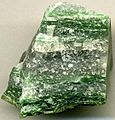Eoarchaean facts for kids
The Eoarchaean (say "Ee-oh-ARK-ee-an") was the very first part of the Archaean eon. It started about 4 billion years ago and ended 3.6 billion years ago. This time came after the Hadean Eon and before the Palaeoarchaean Era.
The Eoarchaean is important because it was the earliest time in Earth's history when our planet had a solid crust. Scientists believe that the first signs of life, called abiogenesis, might have appeared during this period. This was when simple life forms developed from non-living things.
Contents
What is the Eoarchaean Era?
The Eoarchaean was once known as the "Early Archaean." It is the first of four eras within the Archaean Eon. The name "Eoarchaean" comes from two Greek words: eos, meaning "dawn," and archaios, meaning "ancient." So, it means "dawn of the ancient" time.
This era was followed by the Palaeoarchaean Era. Near the end of the Eoarchaean, around 3.6 billion years ago, the first supercontinent called Vaalbara may have formed.
Earth's Early Geology
During the Eoarchaean, Earth finally had a solid crust. However, this crust was probably not complete everywhere. There might have been many areas where hot lava still flowed on the surface.
Asteroid Bombardment
The start of the Eoarchaean was a very busy time for our solar system. It was marked by a period called the Late Heavy Bombardment. This was when many asteroids crashed into the inner planets, including Earth.
Oldest Rocks
The Eoarchaean is the first time in Earth's history from which we still have solid rock formations today. These rocks help scientists understand what Earth was like so long ago.
- The Isua greenstone belt in Greenland is a very old rock formation. It appeared around 3.8 billion years ago during the Eoarchaean.
- The Acasta Gneiss in Canada is even older, at about 4.03 billion years old. It is one of the oldest preserved rock formations on Earth.
- In 2008, scientists found another rock formation in the Nuvvuagittuq Greenstone Belt in Canada. This one is about 4.28 billion years old! Scientists are still studying these ancient rocks to learn more about our planet's early days.
Formation of Oceans
Around 3.8 billion years ago, during the Eoarchaean, Earth's oceans began to form. This was a huge step in making Earth a place where life could eventually thrive.
| Precambrian (4.567 gya – 541 mya) | |
|---|---|
| In the left column are Eons, bold are Eras, not bold are Periods. gya = billion years ago, mya = million years ago | |
| Hadean (4.567 gya – 4 gya) | Chaotian Zirconian |
| Archaean (4 gya – 2.5 gya) | Eoarchaean (4 gya – 3.6 gya)
Palaeoarchaean (3.6 gya – 3.2 gya) |
| Proterozoic (2.5 gya – 541 mya) | Palaeoproterozoic (2.5 gya – 1.6 gya) Siderian (2.5 gya – 2.3 gya) Rhyacian (2.3 gya – 2.05 gya) Orosirian (2.05 gya – 1.8 gya) Statherian (1.8 gya – 1.6 gya)
Mesoproterozoic (1.6 gya – 1 gya) Calymmian (1.6 gya – 1.4 gya) Ectasian (1.4 gya – 1.2 gya) Stenian (1.2 gya – 1 gya) Neoproterozoic (1 gya - 541 mya) Tonian (1 gya – 720 mya) Cryogenian (720 mya – 635 mya) Ediacaran (635 mya – 541 mya) |
Images for kids
-
Garnet paragneiss, Nuvvuagittuq Greenstone Belt, Canada. 4.28 Ga old: the oldest known Earth rock of which direct samples are available.
See also
 In Spanish: Era Eoarcaica para niños
In Spanish: Era Eoarcaica para niños
 | John T. Biggers |
 | Thomas Blackshear |
 | Mark Bradford |
 | Beverly Buchanan |



